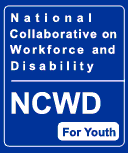Small Business and Self Employment for People with Disabilities
Are you a highly motivated self-starter who is good at planning and organizing?
Do you want to be your own boss?
Would you benefit from flexible work hours and reduced transportation needs?
If so, you might be candidate for starting your own business. The Office of Disability Employment Policy would like to help you explore the many options available for starting a business by putting you in touch with the expert resources and financial programs used by over one million new businesses each year.
Background
Recognizing that people with disabilities have historically demonstrated a strong interest in working for themselves, the Office of Disability Employment Policy initiated a project to ensure
- that people with disabilities will have equal access to the same programs and other resources available to all small businesses,
- that employment programs for people with disabilities, such as vocational rehabilitation, will offer small business ownership as a viable option, and
- that potential entrepreneurs with disabilities know about the process and resources used for starting a business.
Information from the 1990 national census shows that people with disabilities have a higher rate of self-employment and small business experience than people without disabilities (12.2 percent of people with disabilities versus 7.8 percent of people without disabilities.) Even so, entrepreneurship for people with disabilities is often overlooked by government programs and by many people with disabilities as an avenue from the public rolls to self-sufficiency. The Rehabilitation Services Administration (RSA) statistics for 1997 show that only 2.7 percent of the 223,668 vocational rehabilitation clients with successful closures became self-employed or started a small business. However, RSA's own recent demonstration programs on client choice reported that between 20-30 percent of their participants chose self-employment, substantially above the rate of self-employment or small business closures reported by state vocational rehabilitation agencies.
These statistics are particularly relevant now because of trends in the national economy. The very nature of work is changing. Governments and private sector employers are reducing their workforces, shifting toward more contingent employment, including temporary, part-time and contract employees. These trends are increasing the demand for contract services and goods and many people are responding by starting small businesses or becoming self-employed.
Barriers to Entrepreneurship for People with Disabilities
Starting a business is a major task for anyone. People with disabilities face additional barriers. It is critical that the potential roadblocks be recognized early on.
From attitudinal barriers to lack of coordination among federal programs, an array of obstacles confront adults with disabilities who want to start a business:
- possible loss of cash benefits from Social Security or Supplemental Security disability programs
- possible loss of health care benefits associated with cash programs
- possible loss of housing and other subsidies
- inability to access capital needed to start a business because of
- poor credit ratings
- lack of assets to use as collateral
- cash benefit programs that do not provide sufficient funds for both living expenses and savings
- income support programs that limit the amount of assets a person can accumulate
- lack of information on how to start a business or write a business plan
- programs for people with disabilities that frequently do not support or encourage self-employment and entrepreneurship
- programs promoting self-employment and small business development historically have not been to open to people with disabilities.
Other obstacles include unavailability of bonding, inability to obtain insurance, restricted access to support networks, lack of knowledge about bidding opportunities, and discrimination based on misguided stereotypes about the capabilities of people with disabilities.
Benefits of Entrepreneurship for People with Disabilities
Despite the barriers, many enterprising people with disabilities do run successful businesses. Self-employment and small business ownership are attractive to people with disabilities for several reasons:
- freedom, flexibility and independence because you work for yourself
- freedom from disability and access related barriers such as
- transportation
- fatigue
- inaccessible work environments
- need for personal assistance.
Individuals with disabilities who receive income support, such as Social Security or Supplemental Security disability payments, can increase their income while staying within the income and asset requirements of those programs.
In order to promote entrepreneurship opportunities for people with disabilities, the Job Accommodation Network (JAN), an ODEP-supported service, provides individualized technical assistance, consulting, and mentoring services to individuals with disabilities, family members, and service providers. JAN consultants handle each inquiry on a case-by-case basis, offering self-employment and small business development expertise and referrals regarding all aspects of entrepreneurship. Among these are business planning, financing strategies, marketing research, disability-specific programs, income supports and benefits planning, e-commerce, independent contracting, home-based business options, and small business initiatives for disabled veterans. JAN customers can expect to receive a resource packet tailored to their specific entrepreneurial goals with consultants available throughout all stages of the process who can provide ongoing supports. JAN's services are available free of charge through their toll-free numbers (800)526-7234 (V); (877)781-9403 (TTY)or 1-800-232-9675/V/TTY; and their Web site at http://www.jan.wvu.edu/entre/.











